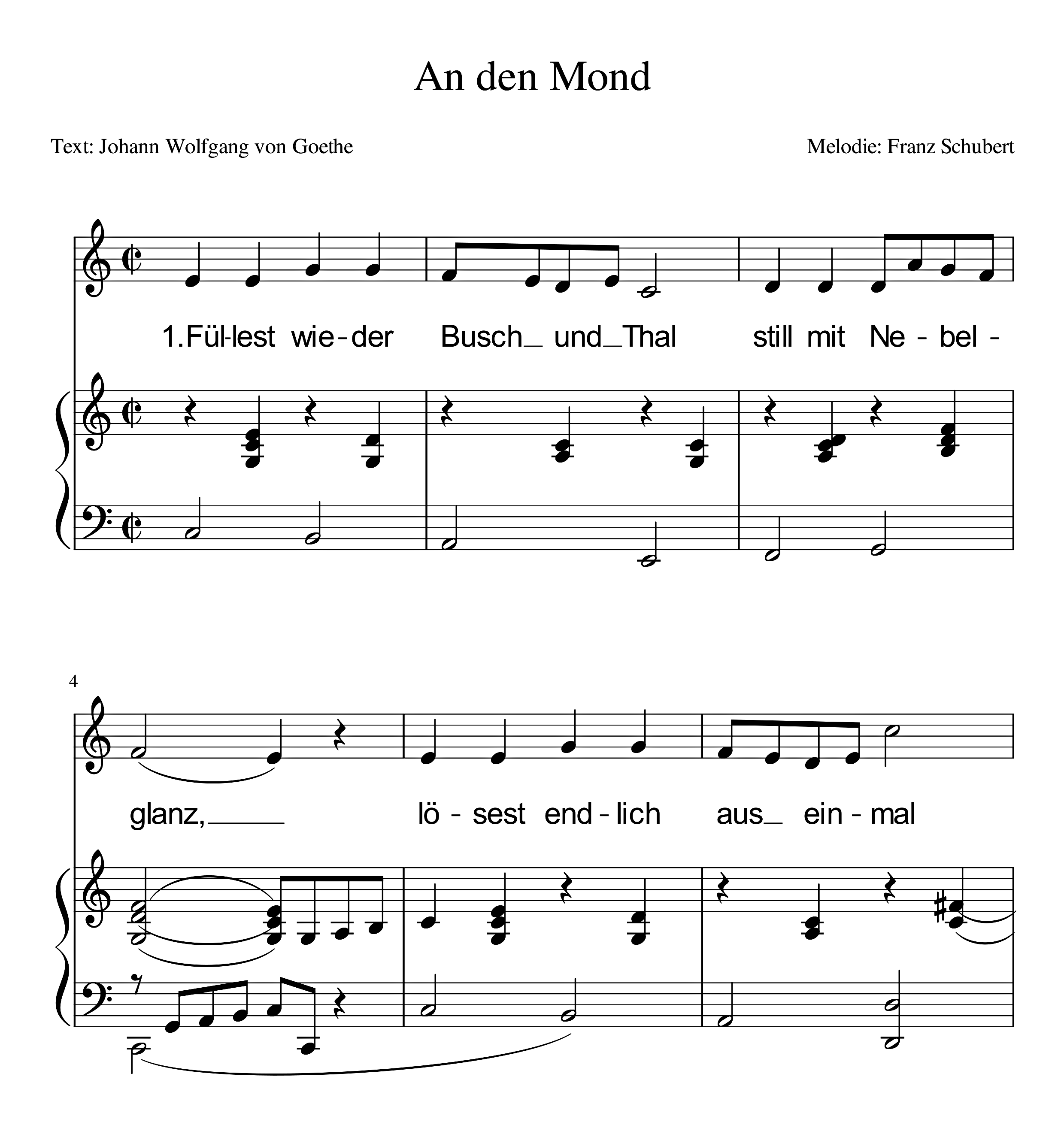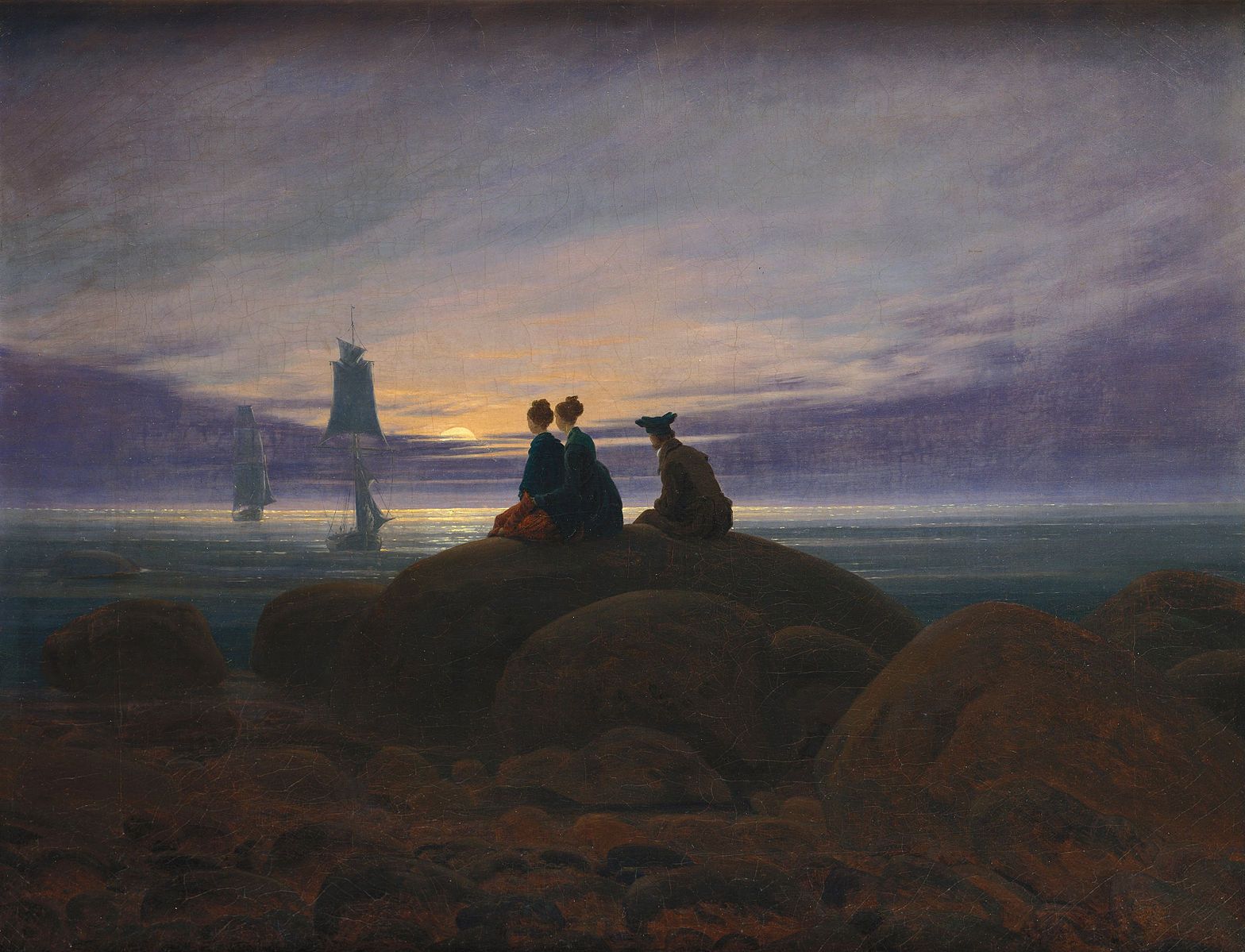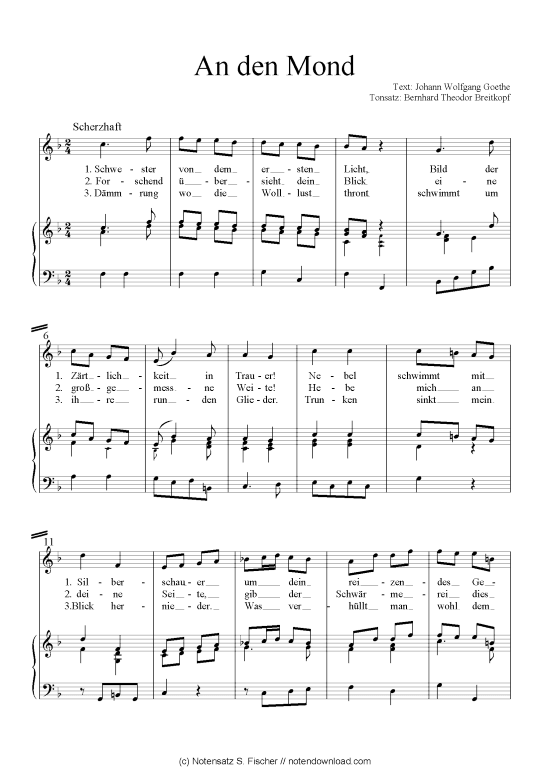
An den Mond Gedicht von J.W.von Goethe YouTube
In contrast to my last video of Pfitzner's "An den Mond", here is the second of Schubert's settings of the same Goethe poem. Schubert's first attempt (D. 259.

An den Mond (Interpretation)
Wo sie den Bach belauscht. and lay a wreath on that meadow. Then, beloved moon, take your veil once more, Dann, lieber Mond, dann nimm den Schleier wieder, and mourn for your friend. Und traur um deinen Freund, Weep down through the hazy clouds, Und weine durch den Wolkenflor hernieder, as the one you have forsaken weeps. Wie dein Verlassner weint!

An Den Mond Goethe 1777 DE Goethe
Schubert's "An den Mond" is a brilliant composition. In fact, Schubert wrote two songs called "An den Mond", but this is identified as "An den Mond D. 259" (this "D. 259" is just a way of cataloging Schubert's music). This song is set to text by the famous German poet Goethe. The speaker observes that the moon, our constant companion in our.

Deutsche Lyrik von damals und heute Zitate aus gedichten, Gedichte und sprüche, Goethe zitate
An den Mond German source: Johann Wolfgang von Goethe Füllest wieder Busch und Tal Still mit Nebelglanz, Lösest endlich auch einmal Meine Seele ganz. Breitest über mein Gefild Lindernd deinen Blick, Wie des Freundes Auge, mild Über mein Geschick. Ich besass es doch einmal, Was so köstlich ist! Dass man doch zu seiner Qual Nimmer es vergisst.

An Den Mond Goethe Analyse DE Goethe
Johann Wolfgang von Goethe. An den Mond Über mein Geschick. Melodien zu, Oder nicht bedacht, Wandelt in der Nacht. To the Moon With your silent gleam. My poor soul quite free. Flood across my field of view With your soothing gaze. Let a friendly eye so mild Tell me of my fate. Glad and sombre times In my solitude. And the faithfulness.

An Den Mond Goethe Interpretation Sturm Und Drang DE Goethe
Johann Wolfgang von GoetheAn den Mond (gesprochen von Hans-Jörg Große)Füllest wieder Busch und TalStill mit Nebelglanz,Lösest endlich auch einmalMeine Seele.

An den Mond von Johann Wolfgang von Goethe YouTube
An den Mond Das Gedicht „ An den Mond " stammt aus der Feder von Johann Wolfgang von Goethe. Füllest wieder Busch und Tal Still mit Nebelglanz, Lösest endlich auch einmal Meine Seele ganz; Breitest über mein Gefild Lindernd deinen Blick, Wie des Freundes Auge mild Über mein Geschick. Jeden Nachklang fühlt mein Herz Froh- und trüber Zeit

An den Mond (Audible Audio Edition) Johann Wolfang von Goethe, Matthias Ubert
An den Mond ist ein Gedicht von Johann Wolfgang Goethe aus dem Jahr 1778. Inhaltsverzeichnis 1 Inhalt 2 Kommentar 3 Literatur 4 Weblinks Inhalt Thomas Cole: „Mondlicht" Das Gedicht beginnt mit den folgenden Versen: Füllest wieder Busch und Tal Still mit Nebelglanz, Lösest endlich auch einmal Meine Seele ganz;

An den Mond (Klavier + Gesang) Goethes Leipziger Liederbuch
An den Mond ist ein Gedicht von Johann Wolfgang von Goethe. Es existieren zwei Fassungen: die erste von 1778 und die zweite, bekanntere, von 1789. Du kannst das Gedicht dem Sturm und Drang zuordnen. In dem Gedicht geht es um ein lyrisches Ich, das vom Leben und den Freundschaften enttäuscht ist und sich deshalb in die Natur zurückzieht.

Deutsche Lyrik von damals und heute — “An den Mond” von Johann Wolfgang von Goethe
"An den Mond" by Goethe "Wald und Wasserfall im Mondschein" by Carl Gustav Carus The poem An den Mond by Goethe has a musical setting by Schubert. In this German speech recitation, we chose instead the Adagio from Beethoven's Moonlight Sonata played on the classical guitar.

An den Mond Goethe Etching by Rudolf Grossmann Munich, 1920 kedem Auction House Ltd.
Johann Wolfgang von Goethe - An den Mond lyrics + English translation An den Mond → English translation 3 translations • 8 translations of covers Original lyrics An den Mond Füllest wieder Busch und Tal Still mit Nebelglanz, Lösest endlich auch einmal Meine Seele ganz; Breitest über mein Gefild Lindernd deinen Blick, Wie des Freundes Auge mild

Goethe An Den Mond 1789 DE Goethe
Goethe's lyric, "An den Mond," is about equally famous for haunting fascination which it has always exercised upon its and for the baffling resistance which it has offered to a and satisfactory interpretation. The barriers to an interpretation, however, are largely external, and when they are removed,

Johann Wolfgang Goethe „An den Mond" I YouTube
An den Mond Still mit Nebelglanz, Lösest endlich auch einmal Meine Seele ganz; Breitest über mein Gefild Lindernd deinen Blick, Wie des Freundes Auge mild Über mein Geschick. Jeden Nachklang fühlt mein Herz Froh- und trüber Zeit, Wandle zwischen Freud' und Schmerz In der Einsamkeit. Fließe, fließe, lieber Fluß!

Goethe An Den Mond 1789 DE Goethe
of the fate of the unhappy girl to that of the more fortunate woman (Frau von Stein), who can withdraw from the world with her lover and enjoy that ideal love which is either unknown to most human beings or despised by them. The version of 1789 follows: Fullest wieder Busch und Tal Still mit Nebelglanz, LJsest endlich auch einmal Meine Seele ganz;

Johann Wolfgang von Goethe An den Mond Caspar david friedrich, Impressionistische
In Goethes Gedicht "An den Mond" wird der Mond zu einem Freund, dem sich das lyrische Ich anvertraut und von seinem Kummer berichtet. Diese Interpretation wird auch durch die Form des Gedichts unterstützt, wie Du in der Analyse sehen kannst. Inhalt von Fachexperten überprüft Kostenlose StudySmarter App mit über 20 Millionen Studierenden

an den mond von goethe johann ZVAB
An den Mond German source: Johann Wolfgang von Goethe Füllest wieder Busch und Tal Still mit Nebelglanz, Lösest endlich auch einmal Meine Seele ganz. Breitest über mein Gefild Lindernd deinen Blick, Wie des Freundes Auge, mild Über mein Geschick. Jeden Nachklang fühlt mein Herz Froh- und trüber Zeit, Wandle zwischen Freud and Schmerz